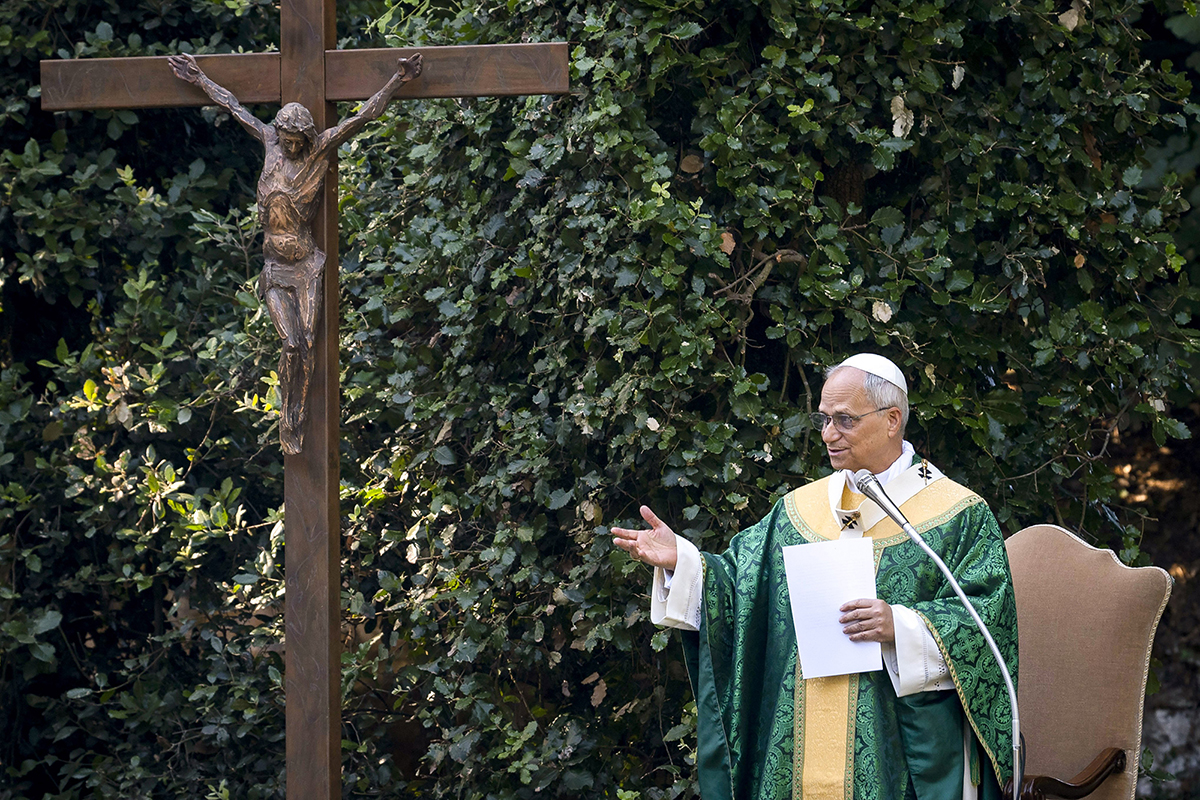BEFORE THE CROSS | Ordinary Time prompts us to strive for the moral norm

We should go beyond what usually happens and move toward what God intended
As we re-enter ordinary time this week, I want to ask: what counts as “ordinary?”
There are things that are statistically ordinary but not morally ordinary — the way things are, but not the way they were meant to be. Do we settle for the statistical norm, or strive for the moral norm? Let me give some examples.
After the Florida school shooting in February, some reports claimed that 26 of the 27 deadliest shooting cases in America had one thing in common: the absence of an engaged, biological father in the home of the shooter. Closer inspection revealed the number to be a little lower — 21 or 22 of them — but still the vast and disproportionate majority.
I don’t point that out to make a political point but a moral one: When men drop the ball on their responsibilities, everyone pays a price. When it comes to fatherhood, men in America are dropping the ball on a massive scale.
That isn’t a new story, though. It’s as old as the Fall of Adam and Eve. We often miss the details of that story, however. Since they shed some light on the perennial human situation, it’s helpful to walk through them in slow motion.
After the Fall, when God asked Adam what happened, Adam immediately blamed Eve: “The woman whom you put here with me — she gave me fruit from the tree, and so I ate it.”
At that point, we’re meant to pause, just as the conversation would have paused. Every parent knows that, in that pause, a question written in God’s eyes rather than spoken in words passed between God and Adam: “And you knew it was wrong, and that I told you not to do it, and that it would be harmful for her and for you. And knowing all that, you followed her rather than me?”
We’re supposed to let that question sink in, because it isn’t just a question for Adam. It’s a question for each of us, because we’ve all done the same thing.
After that God turns to Eve to ask her what happened. She says: “The serpent tricked me into it, so I ate it.”
At that point we’re meant to pause again. We’re meant to hear not only the words but also the frustration that would have been in Eve’s voice: “And the man, to whom you gave me, who was supposed to be my protector, stood by and didn’t say or do anything. He just let it happen.” At that point we’re supposed to rewind the tape, to see where Adam was while the serpent was talking Eve into sin — and to notice that he was right there the whole time.
The story of the Fall concludes: “The man called his wife, Eve, because she became the mother of all the living.” In saying this, Scripture isn’t merely telling us what happened. It’s also telling us that their mess is our heritage. We can confirm that with numbers: the dysfunctions of Adam and Eve have become our statistical norm.
Another Biblical scene sheds light on our situation. But this time it provides the moral norm — things as they were meant to be.
Picture Jesus on the Cross, Mary at the foot of the Cross, and John the apostle standing by her.
Jesus is the new Adam. When His side is pierced, blood and water flow out. These are symbols of baptism and the Eucharist. They show how the Church is born from the new Adam’s side, just as Eve was born from the first Adam’s side.
Jesus is doing what Adam was supposed to do. The Church is threatened by the devil. Jesus lays down His life to conquer the serpent and protect His bride.
John, in this scene, represents all Christians. When Jesus says to him, “Behold, your mother,” He says that Mary is the new Eve. (That’s why He calls her “Woman.”) By giving her to John as Mother, He says that she is the mother of all who will live in Christ. The new Adam, even as He’s dying to protect His bride, makes sure that the mother of all the living will be taken care of.
Jesus is doing what Adam should have done, and what all men are called to do: lay down his life to protect the woman, rather than use her or abandon her. These rightly ordered relations are part of our heritage, too. They mark out the moral norm — the way things are supposed to be.
Don’t misunderstand me. I’m not saying that women are weak, or weaker than men. Let me say clearly what we all know, and need to remember: women are strong, and in many ways stronger than men.
What I’m saying is that there’s a basic Biblical pattern here that calls to men, and shows how they are supposed to relate to women. Men violate that call by excess when they become domineering — history shows that, and pornography exemplifies it. They violate that call by defect when they become absent — history shows that, and an increasingly fatherless America exemplifies it.
But if men haven’t lived up to the role God gave them — and they haven’t, not from the beginning, and not to today — and if everyone is paying a terrible price for it (they are), the solution isn’t for men to stop being men. The solution is to return to the pattern established by God.
To illustrate that men aren’t living up to the role God gave them, look at the scourge of pornography. Did you know that Hollywood makes 600 movies a year, turning a profit of about 10 billion dollars, while the pornography industry makes 13,000 films a year, turning a profit of about 15 billion dollars? Pornography generates more revenue than Major League Baseball and the NFL and the NBA combined. Did you know that pornography sites get more traffic than Netflix and Amazon and Twitter combined, and that the largest pornography website alone reported more than 4,500,000,000 viewing hours in 2016? When it comes to protecting the dignity of women, men in America are dropping the ball on a massive scale.
The dysfunctional relations of Adam and Eve are our heritage. Statistically, that’s our norm. The rightly ordered relations between men and women, rooted in Christ and Mary, are also our heritage. Morally, that’s our norm. We have to choose between these norms.
So, men, as we re-enter ordinary time, I pose this question to you: What will you make ordinary?




